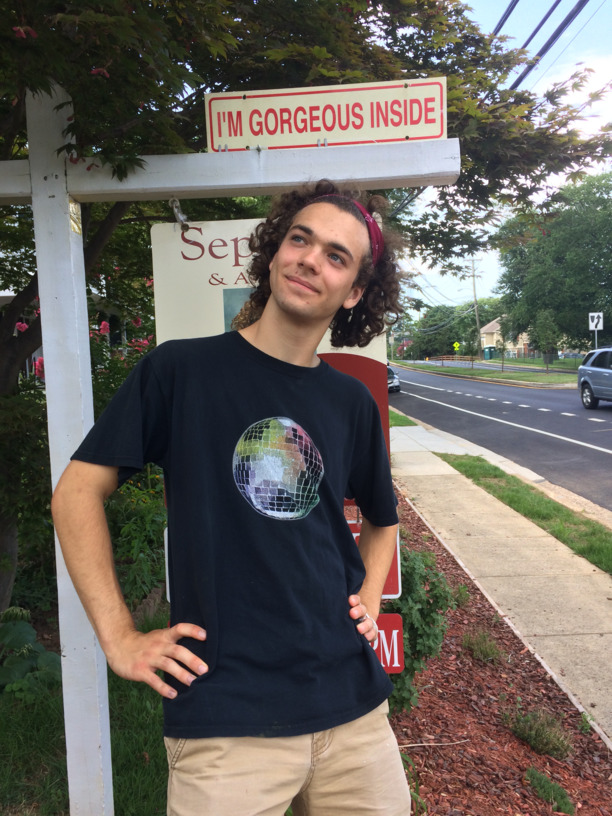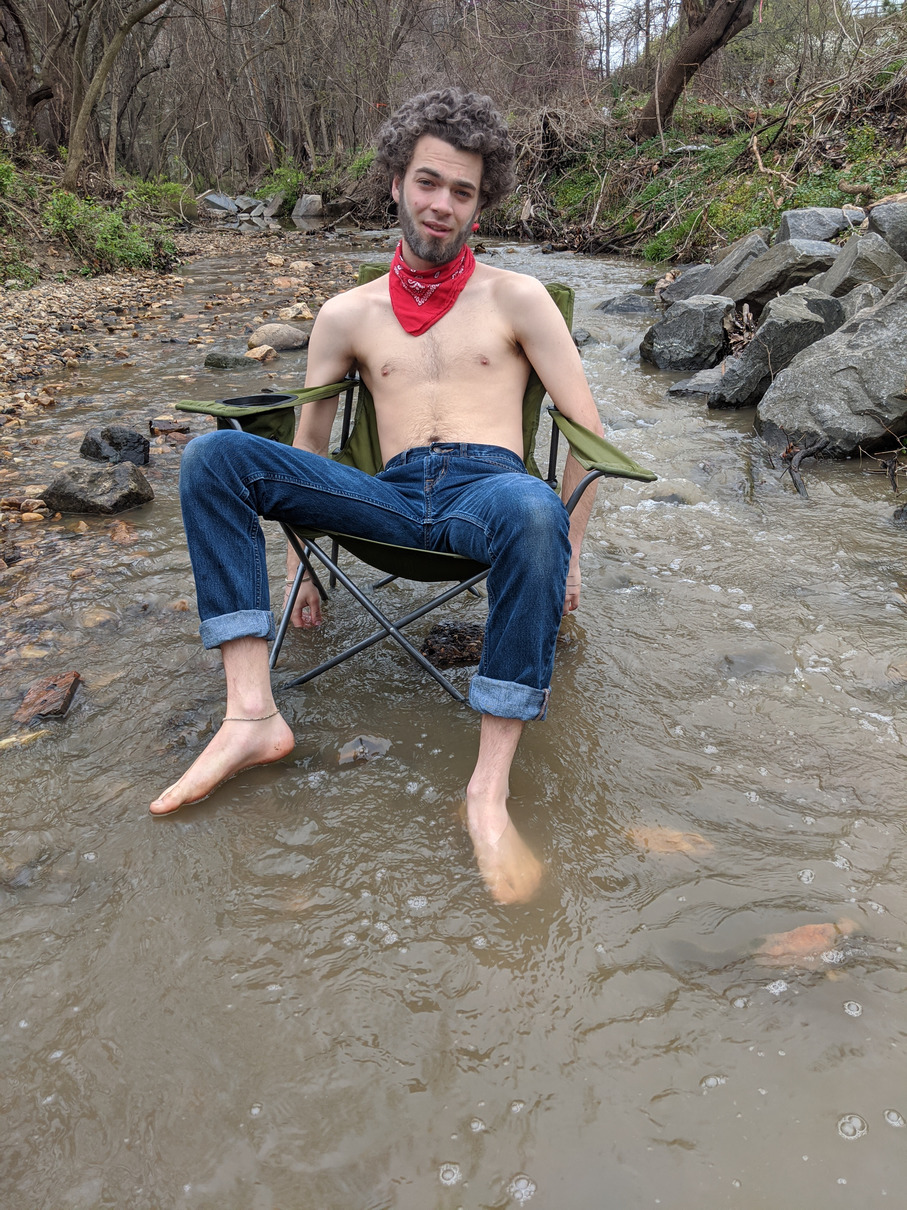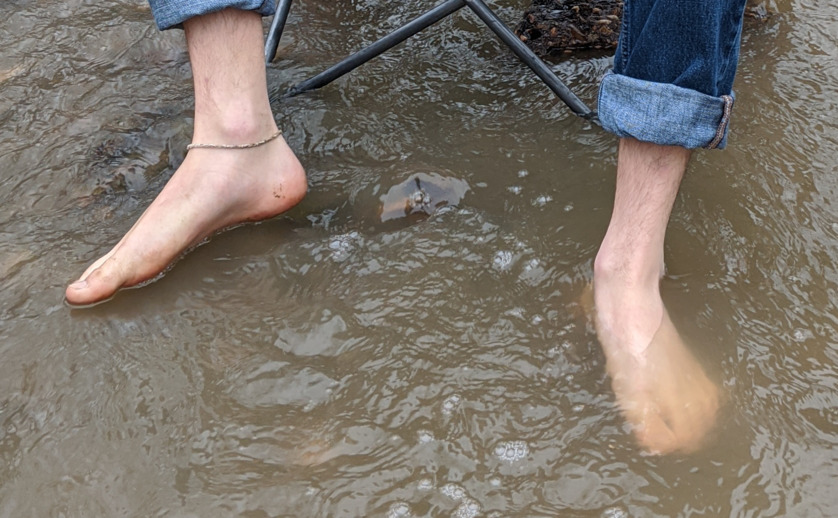The Drongo, Interview #12: Jacob Hall
by Maxwell Joslyn. .
Welcome, each and every drongo, to The Drongo's first interview since our summer hiatus. We've got a real rock star for our guest today!
Receive new interviews twice a month. Subscribe to The Drongo for free!

The Drongo: Our guest for this round of The Drongo is Jacob Hall. He's provided us the following third-person biography.
Jacob Hall: "You'd likely recognize Jacob Hall pretty quickly if you ran into him on the street: he's always barefoot, he's either wearing his pants or either of his two shorts, and his hair keeps changing colors.
He currently lives in Williamsburg, VA, studying geology at William & Mary, producing educational media for the on-campus Studio for Teaching and Learning Innovation, and co-managing a student-run house/venue/coffee shop called The Meridian. In his free time (read: procrastinatory sprees) he develops websites for himself and friends, cooks for anyone in earshot, and goes on very long walks."
The Drongo: Jacob, thank you for joining us today. I'm grateful that, though we've only known each other since early 2021, you were willing to participate in this project.
Before our interview, I searched online for university geology curricula to better understand your field. It appears that as a Geology major at W&M, you're learning a mix of inorganic chemistry, physics, mineralology, hydrography, and ecology -- with options for GIS, surveying, maybe even drone piloting.
Jacob Hall: As you say, there are so many fields that come together to make "geology." This makes for a wide range of potential problems to solve, but also a lot of different tools a geologist can use to solve any given problem.
The Drongo: Well then, if I've hit the broad strokes, please fill in the details: how do you synthesize all those fields? What is a "problem" in geology -- the counterpart of a math problem -- and how do you attack it?
Jacob Hall: Here's an example. Right now, I'm researching the presence of radon in Williamsburg. This project involves understanding both the stratigraphy (layers of rock) where uranium can be found, and the radioactive decay processes that eventually turn uranium into radon. So many of the fields you listed are relevant to radon research, from the composition of sedimentary deposits, to the GIS tools that help us predict where we should be worried about radon exposure.
Dear reader, exposure to radon increases your risk of lung cancer, and if your house might have concentrations of it, please get a test kit!
The Drongo: What does a fieldwork expedition look like?
Jacob Hall: The geology department has a reputation at William & Mary for having the most frequent field trips!
Last semester, one of my classes drove out to the James River and used gold pans to collect heavy mineral sands from the shore. Most "sand" (you know, the white/yellowy stuff that gets everywhere) is quartz, but depending on the situation you might find other, denser grains mixed in, such as magnetite and ilmenite. Geologists can also often be found augering holes to determine the concentrations of different rocks, or where the water table is at a specific location.
The Drongo: Just the other day, I found a rock and mineral website offering a huge, open-access database with photos and explanatory articles.
You don't run any geology websites, so far as I know, but you're a cybercitizen as much as you are a geological guru. Readers, Mr. Hall has computing and programming skills beyond the average non-CS major.
Jacob Hall: It's a really exciting time to be a budding website developer. The Internet has matured so much that nearly everyone has experience navigating it, and interpreting the websites that flash onto their screen as they do so. So much effort has gone into refining the common languages used to populate your screen with memes and words and emojis.
This mass adoption has meant that website development is an art form nearly anyone can consume, which is really exciting to me. I'm motivated by the idea that my work could be almost universally consumable by my friends, family, and strangers -- whoever comes by to visit my site.
The Drongo: Tell me about your own website, and what you've done to run sites for others.
Jacob Hall: My best friend Ben has taught me how to use Linux over the years, encouraging me to build my own computer and experiment with programming in different languages. I learn things about computing as I need to in order to create what I dream up. I love that this hobby can apply to most areas of my life, from getting a job writing code, to syncing the TV show we're watching to my partner's computer.
Any-who, my website is sort of a living representation of my identity. I've written the whole thing from scratch, and I am confident that it represents my style and values. That being said, it's an ongoing project to build all the features that I want to have. For example, I've gotten really excited about the IndieWeb recently. Basically, the IndieWeb is a set of specifications by which personal websites can interface with each other to form a social network.
The Drongo: For those unfamiliar with the term, I'll add that the IndieWeb includes not only the network of websites that interoperate to form a social network, but also the community of people running those sites. Motivated by a shared distrust of centralized social media platforms and their incentives, we use our personal websites to replace social media, while collaborating on a finely-detailed wiki of social media code and design patterns so that anyone can follow in the whole group's footsteps.
Jacob Hall: Maxwell is actually one of the friends I met through the IndieWeb!
The Drongo: Yep, we met early this year, at the IndieWeb's weekly Homebrew Website Club -- and now, here you are, doing an interview which will land on my website, and which you'll probably repost to yours.
Since we're on the subject of social computing, I understand that the IndieWeb is relevant to your own ambitions to run a digital community for your friends.
Jacob Hall: That's right. Over the years, I've accumulated a number of web projects that I maintain. There's an archive of my high-school's historic documents, a friend's collection of interactive poetry, and a few other friends' personal sites. I have them all hosted on one server, with everyone having their own login credentials that give them access to their sites' content.
Recently I ran into the tildeverse, a community of public-access Unix systems, and thought: OMG, I sorta run one of those already! So now I have this big dream of establishing my web server as a community, with its own code of conduct and internal tools that members can use. Those tools will include the IndieWeb components I'm building for my own website, and I hope that we will all contribute to building more complex applications on the server together. It feels like I've accidentally already created the alpha version of this community, and my friends have been roped into being my guinea pigs as I develop it further.
If you, dear reader, want to be a part of this, please reach out! This is an open offer to have me develop and host your personal site for the foreseeable future, as long as you're OK with the occasional email about my excited progress.
The Drongo: I know at least two readers are going to be tempted your offer. The desire to control one's own space on the web extends further than some programmers might think.
Alright, Jacob. I've got one more round of questions for you. You must have known when you signed up that I was going to ask you about your habit of going barefoot.
Jacob Hall: I know my bare feet can be seen as a bold statement, but it's hard for me to overstate how normal barefooting feels at this point. I've had people exclaim "Hey, I used to do that too!" and it took me a minute to realize what they were even talking about. Going barefoot is most comfortable for me, and after doing so full-time for many years now, I'm focused on seeking out the people and places that accept me most for my lifestyle.
The Drongo: I accept you, Jacob.
Now, please make like a camgirl and show me dem toes.
Jacob Hall:

The Drongo: Little closer...

The Drongo: That's the ticket.
I've read your barefooting FAQ; for the benefit of the audience, and to save you from retreading old ground, I'd like to include a few quotations. Assuming, since it's on your website, that it still represents your views.
Jacob Hall: Feel free.
"Why do you go barefoot?"
In short, I find it more comfortable.
It feels nice to "feel the ground" with my feet. There are so many interesting sensations! Texture, temperature, etc. Shoes are uncomfortable for me. I only want to wear them when I need to keep my feet warm, like gloves. Going barefoot is increasingly a part of my identity. I feel more myself when I'm barefoot, and I love meeting other people who enjoy to go barefoot.
Sometimes people will ask me if I go barefoot to be "grounded" or for a heightened sense of spirituality. I honestly don't know much about grounding, and it's not something I ever think about. As an atheist, I don't find much religious or spiritual meaning in going barefoot, but it's cool that other people do!
People have asserted that I go barefoot to attract more attention. I love meeting and talking to people, and freely admit to expressing myself in ways that spur conversations! I honestly forget that It's Weird To Go Barefoot. Along with the way I dress, do my hair..., the way I express myself is genuine. It's OK if you don't think my self-expression is attractive or sexy or tasteful, but I do!
from Jacob's "The Barefoot FAQ"
The Drongo: There you are, readers: Jacob wants to go around with nothing between his feet and the ground. No special message or higher calling needed.
Is there much of a barefooting community in Virginia? Are you doing anything to spread the word?
Jacob Hall: I recently wrote an opinion in my school newspaper responding to a previous article about barefooting at our library. It felt good to articulate my thoughts about barefooting on campus in a more formal setting.
I got a lot of really kind feedback from the community, and an invitation to join the Society for Barefoot Living! I'm excited to be growing as an advocate for barefooting.
The Drongo: Congratulations! It must feel good to come into contact, all at once, with so many other like-minded barefooters.
I know of your wilderness and outdoors days, because they informed the wilderness packing recommendations on your website. I'm curious to know whether you have gone barefoot on trails, or on even rougher terrain.
Jacob Hall: Yes! I've gone on 20+ mile hikes barefoot over all sorts of terrain. It's fun to feel the different surfaces under your soles as you walk. 😁
The Drongo: Do you have a good wilderness story for us? It need not star your feet.
Jacob Hall: It was a hot summer night in 2017. My friends and I had been hiking southbound on the Appalachian Trail for three weeks.
We rolled up to a shelter just as the sun was coming down, and rushed to make dinner and pitch our tent before it got too dark. If you're backcountry camping in that area, one of the most important things to do before you go to sleep is hang a bear bag with all of your food in it, so that bears can't access it in the night.
This was a relatively popular shelter, with many people sleeping in and around it each night, so it featured some vertical poles with hooks, for visitors could more conveniently hang their bear bags. My friends and I packed up our stuff into a dry bag, and walked up the hill to the bear bag poles.
When we arrived, there was a couple already standing there clipping their bags shut. After we'd waited for thirty seconds, they turned to us and muttered, "Here comes Tunnel Rat." I wasn't sure what that meant until I turned around and spotted a tall man emerging from the woods, dressed only in flip-flops, a speedo, and one of those massive Petzl headlamps. I was 17 at the time, and this man was INTIMIDATING. He stood there for a moment, then said, "I don't hang my bear bags. Bears don't fuck with me."
The Drongo: Drongo alert!
Jacob Hall: Tunnel Rat was hiking northbound, so after that encounter we started finding his notes in each logbook along the trail. My favorite one was about him getting drunk in town, and then attempting to night-hike to the next shelter at 2 AM. He got lost, and wandered through the woods for a while before finding the trail again. Tunnel Rat embodied an attitude of freedom and recklessness that I was so eager to find on the trail.
Everyone got their "trail name" for one reason or another. Meatlog ate a massive summer sausage in one go. Noodle Water drank the water we cooked the noodles in. I've always wondered how Tunnel Rat got his name.
The Drongo: You've got me wondering that, too. Perhaps, for our stomachs' sakes, it's better that we don't know. (But if you somehow find out, tell us!)
It's been great having you on the "show" today, my friend. Would you care to share any contact info or social links with the audience, so that they can get in touch with you?
Jacob Hall: Drongos can absolutely get in touch! I've recently changed my email to email@jacobhall.net, so that's probably the best way to contact me, and I can guarantee a relatively timely reply.
https://jacobhall.net is my ever-evolving home, blog, portfolio, and Internet interface... Instagram (@jacobwhall) was my first "real" online presence, and is still my main connection with old friends on the Internet.
On Letterboxd, I'm jacobwhall. I've gotten weirdly excited about Letterboxd as a platform. Maybe it's a rite of passage these days for college students to promote a niche social network. So follow me on Letterboxd!!!
The Drongo: I see on your Letterboxd profile that one of your favorite movies is It's Such a Beautiful Day, which was also recommended by an earlier interviewee, Nick LeFlohic. I recall that the two of you are both into sending postcards on Postcrossing, as well.
Perhaps you two drongos will become brothers-in-arts.
ⵘ ⵗ ⵘ ⵗ ⵘ
That's it for this issue. Again, if you want to try having your own website, with a friendly administrator to help you out, email Jacob.
If you liked this interview, please share it on social media:
https://www.maxwelljoslyn.com/thedrongo/interviews/jacob-hall